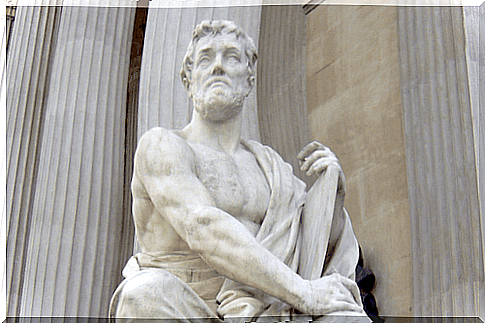5 Sentences From Tacitus

To read Tacitus’ sentences is to take a trip into the classical world. We do not know much about the life of this Roman, however, his brilliant political career led him to the rank of consul.
Cayo Cornelio Tacitus was an ancient Roman politician and historian. His literary work abounded, although not all has been recovered to this day. From what we know, this thinker was very interesting and had very peculiar ideas.

Who was Tacitus?
This Roman historian and consul was born in Rome in AD 55. From what is known, he was a prolific writer, an author of works including Agrícola , a biography dedicated to his stepfather, Cneo Julio Agrícola, a Roman general who fought in Britain.
Among his most notable works, figure Anales , where he tells the story of the emperors of the Julio-Claudio dynasty of Tiberius. Stories also stand out, including those dedicated to the Flavia dynasty.
These works represent a recreation of a convulsive period in Rome. They offer portraits that have allowed us to better understand the workings of one of the greatest empires in the classical world and the history of human civilization itself.
Through the works of Tacitus, we can meet the great figures of his time, their weaknesses and their strengths. All this for the greater glory of Rome, since this author shows in his writings a certain nostalgia for the greatness of the empire and the Republic.
A few sentences from Tacitus
We are now going to immerse ourselves in ancient Rome through the sentences of Tacitus. In each of his sentences, we can benefit from his wisdom and talent.
The power
As we mentioned, Tacitus was nostalgic for the Republic. Phrases like this denote a certain nostalgia. Tacitus tells us there that the power obtained by non-legal means rarely goes hand in hand with an honest goal vis-à-vis the citizens.
Dignity
Dignity and honor were important values in ancient Rome. Today, these points should still be important. We can say that Tacitus valued honest people in their actions and in their daily life, over those who base their attitudes and actions on ends which justify the means, however unethical they may be.
Education and Laws
Education as a backbone is a problem that has always been a social concern. However, when it does not exist or is simply deficient, self-interest and the instrumentalization of the weak begin to gain importance.
Faced with the lack of education, the state and the citizens represented end up needing a large number of regulatory laws. This is in part due to the lack of common sense, empathy, generosity and solidarity. The lack of ethics and morality means that everything is regulated by interest, to protect the weakest, to favor the richest …
The future
This phrase reminds us of a very popular saying: “Better a known evil than a good which remains to be known.” It may be excessive to radicalize it, but it is clear that not all that is to come is always good. Just like the present moment is not as bad as expected.
The meaning of this phrase from Tacitus can be applied today. The best doesn’t have to come, so it’s best to live in the present and not constantly think about the future.

Criticism, according to Tacitus
Yet another sentence that reminds us of a proverb: “It does not offend who wants, but who can”. Maybe when a review bothers us a lot, it’s just plain true.
These phrases of Tacitus are rich in knowledge and respect and invite us to reflect. It is always good to draw inspiration from the sages of yesteryear, because only by knowing the past can we live the present and improve the future.









